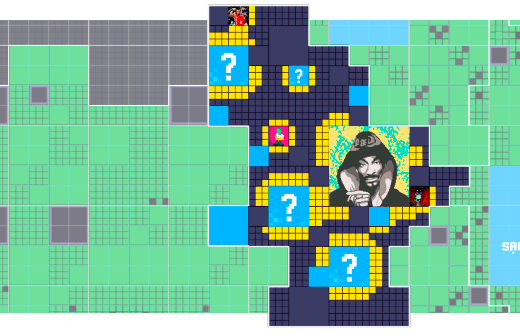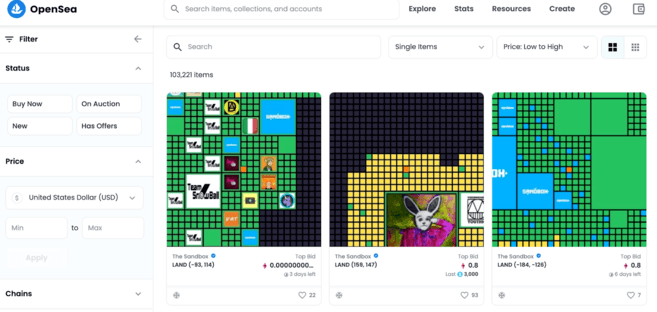NFT virtual land is an ownable area of digital land on a metaverse platform. Popular NFT land projects include Decentraland, The Sandbox, and Axie Infinity. NFTs are suited to representing land ownership as each one is unique and easily proves digital ownership. You can use NFT land for advertising, socializing, gaming, and work, among other use cases.
The landowner can normally use their plot to host online experiences, display content, or gain benefits in a game. Large brands and celebrities, including Adidas and Snoop Dogg, are also beginning to invest in and use NFT land.
The value of a plot is affected by its utility, project, and market speculation. You can purchase NFT land from a project in a land sale or on the secondary market via an NFT exchange, such as the Binance NFT Marketplace or OpenSea. Before purchasing, make sure you understand the risks and use cases of the land and its associated project. In some cases, it might be better to rent instead of buying an NFT land.
Introduction
The metaverse’s development has rapidly created interesting new blockchain use cases. As 2020 was such a massive year for the metaverse and Non-Fungible Tokens (NFTs), it’s no wonder that virtual land has become a hot topic.
Some NFT sales of land have reached prices greater than properties in the physical world, making the concept difficult to grasp for some. In fact, there are actually a lot of similarities between NFT land and typical real estate. But as a digital asset on the blockchain, NFT land has some unique features to explore.
What is the metaverse?
The metaverse is an online, virtual world that will combine multiple aspects of our digital and real lives, including work, socializing, and recreation. 2021 saw many tech giants, including Meta (previously Facebook), Microsoft, and Epic Games, begin developing and exploring the space. Blockchain technology plays a crucial role in the metaverse as digital ownership, identity, and economies are central concepts. For a deeper explanation, read our introduction article to the metaverse.
What is NFT virtual land?
As mentioned, metaverse projects are digital worlds that users can usually explore with 3D avatars. SecondLive, for example, provides areas and venues for concerts, conferences, and expositions. While projects like SecondLive don’t let users purchase a permanent virtual reality space, other metaverse worlds do. Developers create large maps of land divided into small parcels to sell on the market.
To represent the unique ownership of the area, users purchase NFTs linked to a particular plot of land. You can purchase these plots through a land sale directly from the project or on the secondary market. Exactly what you can do with NFT land depends on each project.
What are the use cases of metaverse land?
Apart from speculation, landowners can use their virtual space in various use cases:
Advertising – If your plot is in a popular area or district and attracts many visitors, you can charge for advertising space.
Socializing – You can host events on your digital land, including concerts, conferences, and community meetups.
Gaming – Your NFT land might have a use in an NFT video game. For example, land in Axie Infinity can provide extra resources, tokens, crafting ingredients.
Work – Land that can be explored with a 3D avatar can be used as a virtual office space or to provide digital services. PwC Hong Kong will use The Sandbox land in their Web 3.0 advisory services.
Are global companies purchasing metaverse land?
Prominent celebrities and brands have already begun to purchase land in the metaverse. For example, Snoop Dogg is creating his own Snoop Dogg Metaverse Experience on The Sandbox. Adidas has also purchased space on the platform for their own AdiVerse metaverse experience. Apart from joining in the metaverse and NFT hype, brands and companies will offer users the chance to interact with them by accessing metaverse services, games, and products.

NFT land has even made the jump from retail investors to institutional investors. For example, The Metaverse Group has made headlines purchasing large amounts of digital real estate, which we’ll dive into later. The group is even virtually headquartered in Decentraland’s Crypto Valley. The consultancy firm PwC also bought plots in Decentraland in December 2021 as part of their web 3.0 advisory services.
What affects the price of NFT virtual land?
The price of a plot of virtual land is determined similarly to other non-fungible tokens or cryptocurrencies. There are three main factors to examine:
Utility – Virtual land differs from many other NFTs as it usually has a variety of use cases. These will differ depending on the platform they’re on. For example, digital worlds like Decentraland allow users to customize and create on their land.
If your land is in a popular area or receives many visitors, you could charge for advertising. Your land might also provide you benefits in a blockchain video game. You could have improved staking bonuses or experience unique in-game events like in Axie Infinity.
The platform – Popular platforms like Decentraland, The Sandbox, or the upcoming My Neighbour Alice tend to have higher prices for their NFT land. This is due to market supply and demand. The user base and interest of these platforms are much higher than smaller projects.
Speculation – Large sales of NFT lands in the past have led to an increasing amount of speculation. For example, the NFT real estate company Metaverse Group spent roughly $2.43 million in November 2021 purchasing a parcel of 116 plots of land in Decentraland. Each plot is 16 meters squared, giving them a total area of 1,856 meters squared of land in the Fashion Street district.
Where to buy land in the metaverse
There are two main methods for purchasing Metaverse NFT land. You can take part in a land sale and purchase it directly from the project, or you can buy land from other users through a marketplace.
An NFT land sale is a good way of buying your land at a lower price than on the secondary market. Most large metaverse projects with NFT land have seen rising prices, meaning buying land in a sale tends to be better. Some projects sell all their plots in one go, while others sell them in rounds.
An NFT exchange is the safest and most reliable way to purchase land on the secondary market. This way, both the buyer and seller are protected by a smart contract that ensures the trades occur smoothly for both parties. Binance NFT Marketplace and OpeaSea are two of the most popular options to use. Binance NFT Marketplace supports Ethereum and Binance Smart Chain, while OpeanSea supports Ethereum, Polygon, and Klaytn.

Tips before buying your first metaverse land
Buying NFT land in the metaverse should be treated like any other investment or financial transaction. Make sure to do your own research and consider the points below:
Buy your NFT land from a reputable source. If you purchase the land through a project’s sale, make sure you have the correct official link. If you buy land from someone else, never make any transfers directly to their wallet. You should always make the sale through a trusted, reputable marketplace or crypto exchange. Binance NFT Marketplace and OpenSea are two possible choices, as previously mentioned.
Decide if you want to buy or rent your NFT land. Depending on your needs, you might not need to purchase a piece of land. For example, you might want to host a single event in a popular district. If the platform you’re using supports rentals, then the price you pay depends on the plot’s traffic, closeness to other important plots, and its size.
Consider the NFT land’s project carefully. The project you choose will determine the utility and partly the cost of the NFT. If you want to speculate and resell your land, look at the project’s fundamentals, such as popularity, number of users, and team. If you’re going to sell advertising space or take part in another use case, research which metaverse platforms are most suited to your needs. Not all NFT projects will succeed, so make sure to consider the financial risk before buying NFT lands. If you buy land that has no use or demand, you might end up holding it forever.
Closing thoughts
To many, the idea of virtual land sales might seem far-fetched. However, you only need to look at the rise of NFTs, digital collectibles, and the metaverse to understand how NFT land has developed.
The idea isn’t much different from owning a website or other virtual space. For example, popular domain names have sold for hundreds of thousands of dollars. However, the way NFT lands guarantee ownership is where we see a difference. With the tech world preparing itself for a metaverse future, we shouldn’t be surprised to see even more metaverse NFT land for sale soon.